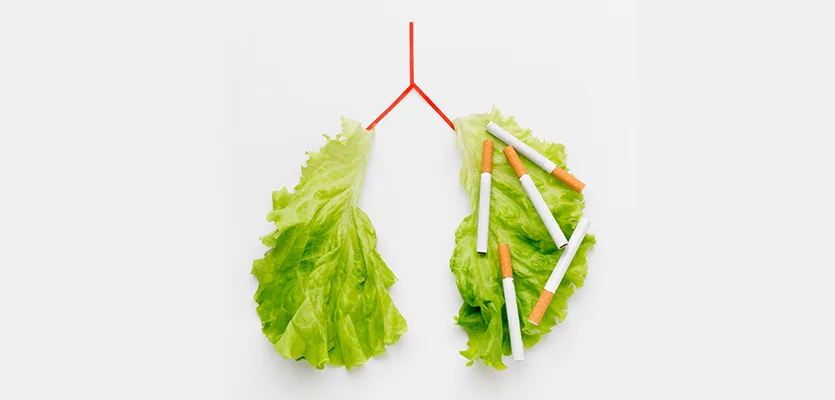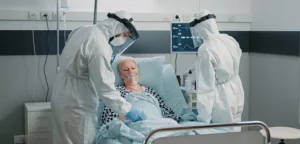A lung transplant is a serious and life altering decision. Since the recovery period following a lung transplant is long and tedious you should make sure that your surgeon and the transplant team are readily available to address your concerns and ensure that you are satisfied with your decisions and available options.
The most crucial time for the majority of patients is the first year following the transplant, when risks from surgical complications, rejection and infection are at their highest. Therefore, it is very important to take particular measures following lung transplant surgery. Within three to six months, a large majority of people resume leading fulfilling lives. Let us quickly go over the key information you need to know about lung transplants before we tell you more about how to stay healthy after a lung transplant.
Lung Transplant Procedure
In a lung transplant, a sick persons lung is surgically removed and replaced with a healthy lung from a different person. Surgery may be performed on one or both lungs. A one time lung transplant procedure can considerably improve your health and quality of life, even though it is a major medical procedure with several potential dangers.
Numerous diseases and conditions can cause damage to your lungs, rendering them incapable to carry out their expected functions.
If your lungs are damaged or injured due to disease, your body may have trouble getting the oxygen it needs to survive.
Medications or specialized breathing equipment can frequently be used to address lung injury. However, your doctor can recommend a lung transplant if these procedures fail to help or if your lung function becomes life-threatening.
Make sure you are informed on the lung transplant procedure, the surgery, any potential risks, and the aftercare when deciding whether to undergo a lung transplant.
Lung Transplant Cost
Based on a number of criteria the cost of a lung transplant in India can range anywhere between 12,50,000 INR to 27,50,00 INR approx.
The single lung transplant cost in India is around 17,00,000 INR.
The double lung transplant cost in India is around 27,50,000 INR.
The combined heart and lung transplant cost in India is around 5,350,000 INR.
Here’s a list of Average Cost of One Time Lung Transplant in major cities of India:
| City | Cost (INR) |
| Bangalore | Rs.13,00,000 – Rs.25,00,000 |
| Delhi | Rs.13,65,000 – Rs.26,25,000 |
| Mumbai | Rs.14,30,000 – Rs.27,50,000 |
| Gurgaon | Rs.13,00,000 – Rs.25,00,000 |
| Chennai | Rs.12,35,000 – Rs.23,75,000 |
| Hyderabad | Rs.13,00,000 – Rs.25,00,000 |
| Pune | Rs.13,00,000 – Rs.25,00,000 |
Aside from these, additional elements that may impact the price of a lung transplant include the admittance charge, surgeon fee, patients age, donor type, medical condition, post-surgical problems (if any), and lab tests or examination tests like an X-ray, an ECG, etc.
Life After Lung Transplant
Youll probably have a markedly enhanced quality of life following your lung transplant—a big procedure for which you carefully prepared. Most patients with lung diseases who receive transplants breathe better, become more active, and can stop using supplemental oxygen. Some people keep working and traveling.
However, even when surgery is successful, adjusting to life after lung transplant has its own difficulties and challenges. You will need to carefully follow your care teams advice throughout your life to preserve the greatest possible health and limit the risk of problems.
Lung Transplant Health Issues
Rejection and infection are the two main lung transplant health issues that transplant recipients have after surgery. Youll need to stay near your transplant facility for a time period determined by your transplant team—typically two to three months—because your risk of rejection or infection is highest in the early postoperative months.
You will have multiple follow-up appointments throughout the first several months. For the first few months, youll probably visit the hospital once a week to be checked on how your lung function is doing. Your subsequent appointments are often less frequent after that.
Tests performed during these visits may include:
- Blood tests
- Pulmonary function tests
- Electrocardiogram (EKG)
- Chest X-ray
- Bronchoscopy
- Biopsy of lung tissue
Other lung transplant health issues include a greater risk of other complications, including tumors and cancers. Be sure you’re up to date on your age-appropriate cancer screenings, such as colonoscopies, mammograms, Pap smears, and prostate screenings etc.
Also, In the early months after transplant, patients can experience a variety of emotions including anger, frustration, guilt, and depression. Treat your psychiatric health like all your other medical issues. Be open and honest with your care team so that they can provide you with optimal care.
Post Lung Transplant Exercise
Mild exercising despite this limitation ensures your body stays fit and can make the most out of your existing lung function. Post Lung Transplant Exercise is also necessary to ensure you are strong enough to recover from surgery and to make the most out of your new lungs when you have a lung transplant.
Life after lung transplant can be demanding and strenuous, mentally, physically, as well as emotionally. Skeletal muscle force and mass drop after transplant due to variables such as hypoxia, malnutrition, large doses of corticosteroids etc which may result in substantial muscular dysfunction. Physical activity as well as respiratory exercises to improve breathing are an integral part of post lung transplant exercise regimen to address deconditioning and the adverse effects of medications and often begin as soon as one gets out of hospital bed.
Physical rehabilitation of lung transplant candidates and recipients is crucial for maximizing physical function prior to transplant and enabling function recovery after transplant. As soon as you start feeling better, you can resume your usual activities. However, keep in mind that it will take several months for your recovery, so you should gradually increase your activity. As you recuperate at home, your physical therapist will prescribe a daily pulmonary rehabilitation regimen that will strengthen your lungs and further enhance your general health.
Lung Transplant Exercise Guidelines
If you adhere to the following basic guidelines, you wont harm yourself or your new lung:
- When you leave the hospital, dont lift anything heavier than 5 pounds, including your bag, and wait at least six to eight weeks after surgery before engaging in any vigorous physical activity. Its crucial that you refrain from lifting anything heavier than 10 pounds six months following your operation.
- After surgery, refrain from driving for at least six weeks. Make arrangements in advance so that a friend or relative can assist you at this time. Wear your seatbelt at all times when riding in a car.
- After your wound has healed, gradually increase your physical activity. It is recommended to exercise. To help you rebuild your strength, we advise starting with stretching exercises and walking. When exercising, pay attention to how you feel; if you get weary or experience discomfort, stop and take a break.
- By exercising on your own or as part of a rehabilitation programme, you can increase your exercise capacity. The extent of your improvement will partly rely on your lungs, your motivation, and other medical issues. Your healthcare professional can give you advice on where to start. Before working out, talk to your doctor if you have any doubts.
- Rough contact sports should generally be avoided since they might harm your transplanted lung. Please see your doctor or the transplant coordinator if you have any questions about any activity.

.webp)



